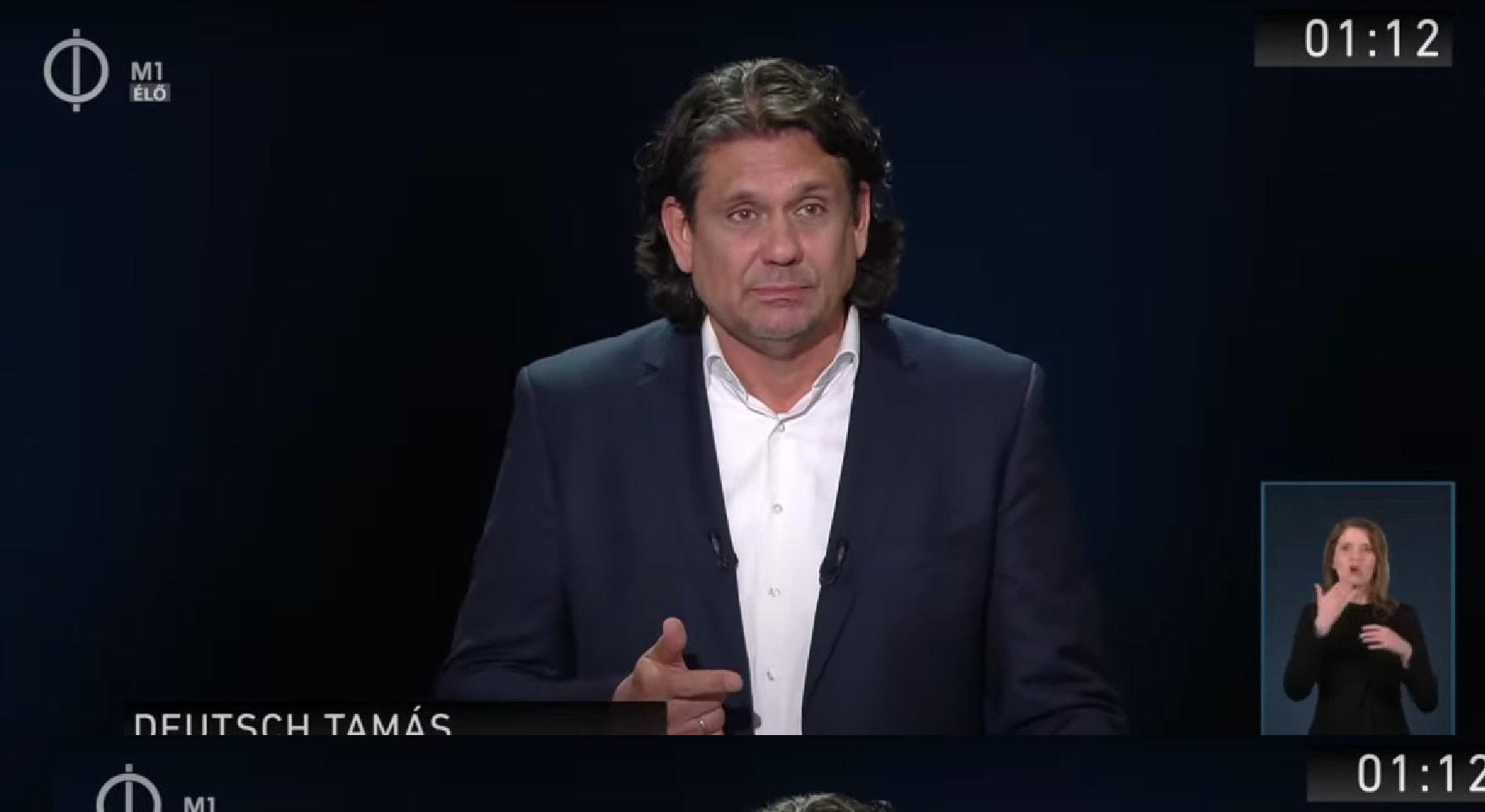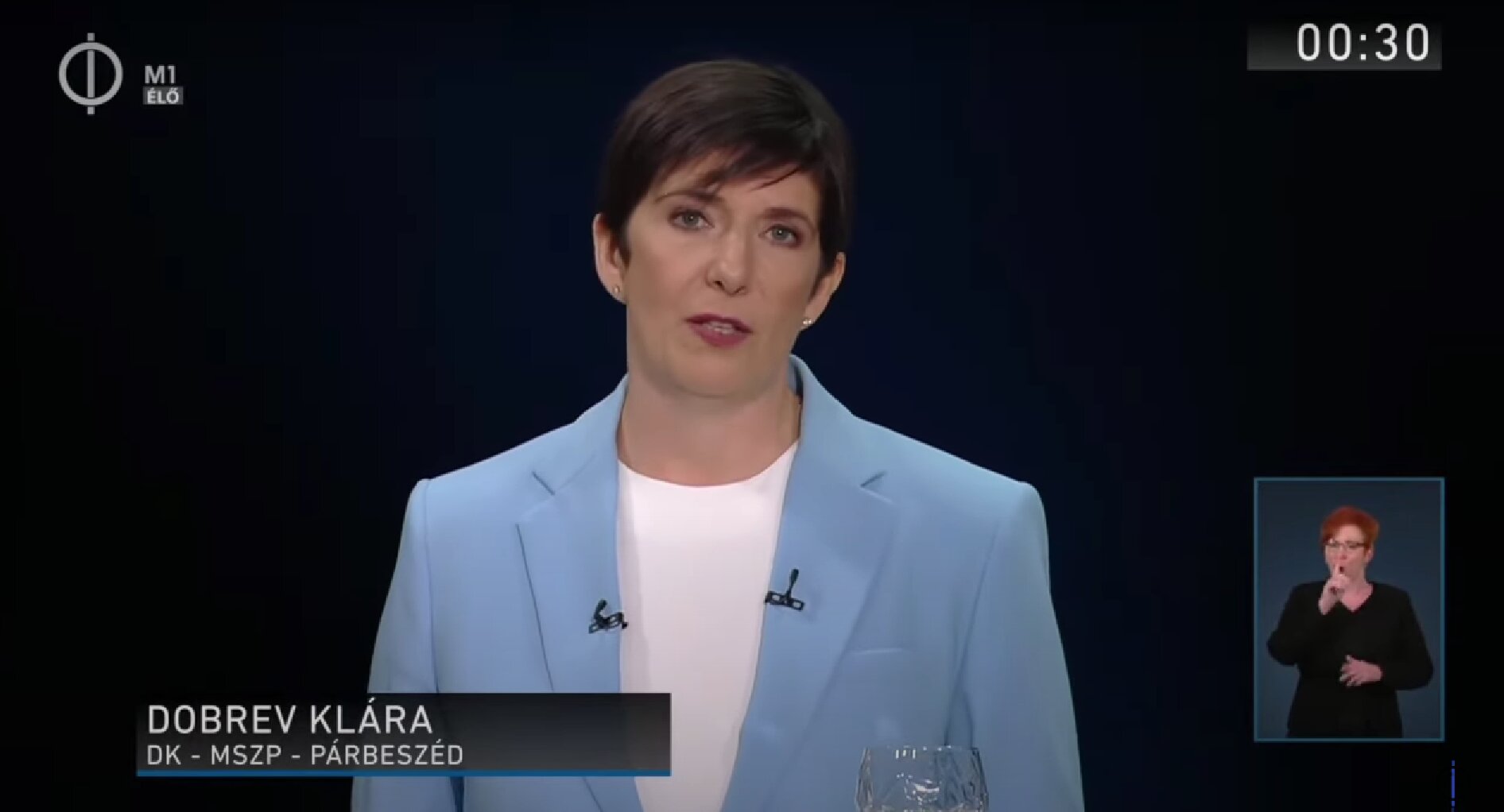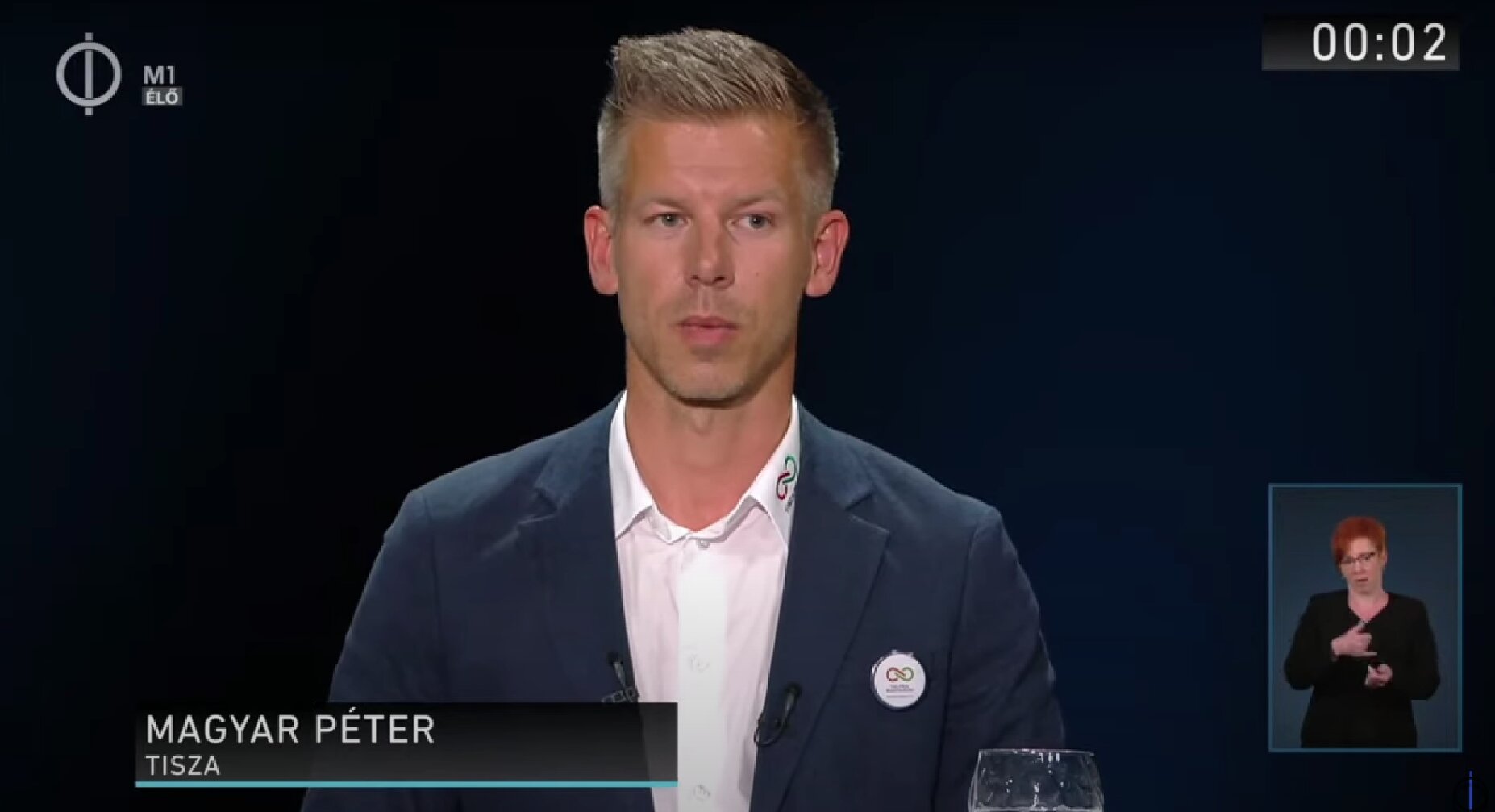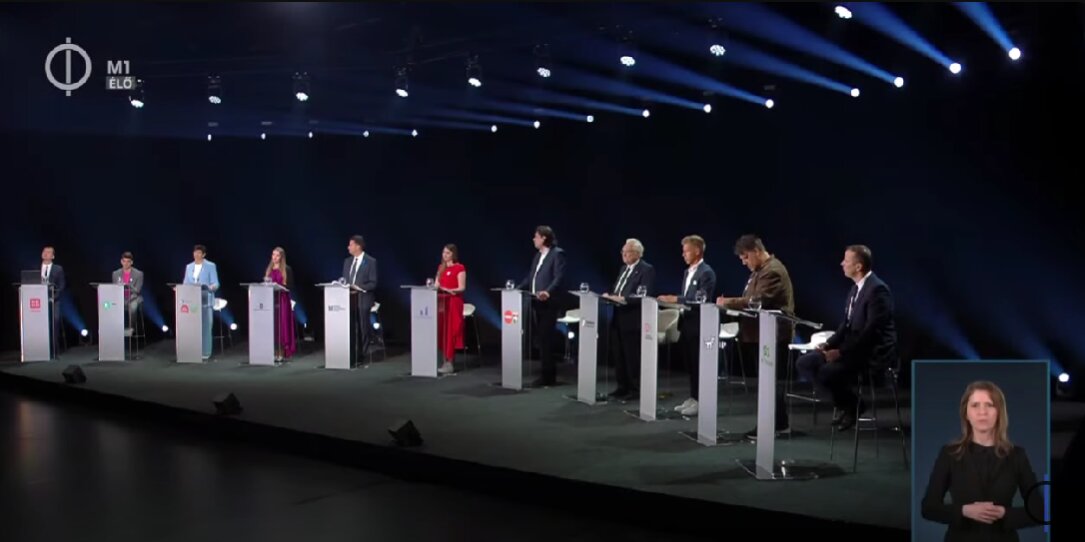Hungarian state TV has first election debate in 18 years

The last debate in which Hungarian politicians, including candidates from Fidesz, engaged in a public discussion took place nearly 20 years ago. Now, in a near-historic event, candidates for the European Parliamentary elections have met to discuss issues such as the defence of the EU and migration. While significant, the event brought no major surprises overall.
The last political debate—between then Prime Minister Ferenc Gyurcsány and opposition candidate Viktor Orbán—was held on Hungarian state TV in 2006, just days before the parliamentary elections. Since then, 18 years have passed without a single election debate involving Fidesz list leaders.
Ahead of the 2024 European Parliament elections, the 11 list leaders met on Thursday evening to discuss four pre-planned topics. Overall, as reported by 24.hu and ATV, the debate produced no major surprises, and no one politician emerged as a definitive winner.
Telex summed up the night: “You simply cannot have a debate with 11 participants. […] There was too little time for each list leader, and the predetermined topics meant that there was no chance for the candidates to react to each other. True, at the end, everyone was given one minute to react, but that one minute per candidate was woefully short of allowing a meaningful exchange of views.”
Instead of a dialogue, the candidates delivered monologues, with no opportunity for responses. In their opening remarks, many opposition members criticised the way the debate was conducted.

Photo: M1 / PrtSc from Youtube
Protecting the European Union
The first topic was the defence of the EU. LMP’s lead candidate, Péter Ungár, said the EU would only become a global power if a common European army were created.
In her speech, the leader of the DK-MSZP-Párbeszéd coalition, Klára Dobrev, said, “On this channel, the truth is not often heard: that the shame of Europe is called Viktor Orbán.” She stressed that Orbán could not represent the interests of Hungarians, and responding to the governing party’s propaganda, she said no one wants to send young people to war, adding,
“anyone who says otherwise is lying.”
Similarly, Péter Márki-Zay, leader of the Everybody’s Hungary People’s Party (Mindenki Magyarországa Néppárt), emphasised that just because something is said a hundred times a day on public television, it does not make it true. Nobody wants war in Hungary, he stressed.
Anna Donáth, the first name on Momentum’s list of candidates, highlighted that common EU values, such as the freedom to decide on one’s end of life, need to be part of discussions about defending the European Union. Therefore, Momentum supports the legalisation of active euthanasia in Hungary, mentioning the case of ALS patient and constitutional lawyer Dániel Karsai.
Fidesz MEP Tamás Deutsch asked his debate partners: “You say there are no pro-war ‘dollar-left’ representatives? Then how come they voted for all the pro-war proposals in the EP?”

Photo: M1 / PrtSc from Youtube
Péter Magyar, leader of the Tisza Party’s EP list, also said it was a lie that anyone who doesn’t vote for Fidesz is pro-war. He argued that every sensible Hungarian rejects war. He criticised the government for sending soldiers to Chad and endangering Hungarian security.
Comedian Imre Tóth, aka Bruti, representing the Hungarian Two-Tailed Dog Party, said they are not “fighting dogs,” and therefore do not want war. He joked that a fence should surround Brussels. “To quote János Lázár: the bureaucrats living on cocaine there should not be able to get out, climb out or slip down various drain pipes. Dear Tamás Deutsch, I apologise for Lázár’s words, but he probably didn’t mean you when he said ‘the bureaucrats living on cocaine’ – that is, the bureaucrat part,” he quipped.
Migration and guest workers
The second topic discussed was migration. Viktor Huszár, a politician from the Solution Movement (Megoldás Mozgalom), said the key issue for the country is Hungarian emigration. According to Péter Ungár, people have always moved to live elsewhere since the beginning of time.
Dobrev stated that state media constantly lies by claiming Orbán protects people and jobs by not allowing migrants into the country, while in reality, more than 21,000 people involved in human trafficking have been released from prison, and over 120,000 guest workers have been brought into the country by Fidesz.

Photo: M1 / PrtSc from Youtube
Márki-Zay said that 50,000 migrants will move to Debrecen to work on battery plants, and that Fidesz has brought criminal migrants and terrorists to Hungary through its residency bond programme.
Deutsch countered that, with Brussels’ help, Europe is being invaded by illegal migrants. Wherever pro-immigration governments let migrants in, crime is on the rise. He said that the influx of migrants is part of the Soros plan, which left-wing parties support because they receive funding from abroad.
Péter Magyar stressed that his party condemns illegal immigration and supports the border fence on the southern border. He said that the government wants to solve the issue of Hungarian emigration by inviting in guest workers, but this is “a political drug” that they should not become accustomed to.
Agriculture and the rule of law
In the third round, participants in the debate had a choice between two topics: agriculture or democracy and the rule of law.
Dobrev mentioned that President Tamás Sulyok, when he was still a lawyer, had transferred Hungarian farmland to Austrian hands.
According to Márki-Zay, Hungary does not receive EU funds because of the lack of the rule of law. Where there is no rule of law, the strong threaten the weak and the dishonest get ahead, said Donáth. Tamás Deutsch reacted to the opposition politicians’ words: “Let’s stop talking nonsense: the rule of law is a common left-wing discourse, a shabby theatre.” He said that the rule of law procedures are political instruments.
According to Péter Magyar, the government pretends to be family-friendly and supportive of rural Hungary, but in 14 years the number of family farmers has fallen by a third, and fruit and vegetable production is in constant decline.

Photo: M1 / PrtSc from Youtube
Bruti said it was unpleasant to listen to Deutsch live, and that on Facebook at least you can scroll past his videos. His party would launch a national consultation on battery factories, asking what product from the land people would rather eat: bread or batteries.
László Toroczkai of Our Homeland said his party wanted to give rights to law enforcement agencies instead of criminals, and that Ursula von der Leyen should be held accountable over Pfizer contracts.
The final minutes of the debate
In the last round, the politicians had one minute each to talk about their programmes and respond to what others had said.
Viktor Huszár said that Hungary’s future should be decided by professionals, not by politicians from the right or the left.
While Péter Ungár said it is good that there was such a discussion and that such politics has its place in Europe and in Hungary, Dobrev, on the other hand, said the debate only showed that politicians are capable of monologues. She said she would take part in every debate, even listening to Deutsch’s “crazy nonsense.”
Péter Márki-Zay asserted that he believes László Toroczkai represents Putin, and that Gábor Vona, as president of Jobbik, got a Russian spy into the EP.
Anna Donáth asked one of the moderators of the debate, who used to work for Katalin Novák, about the clemency scandal.
“Tonight’s debate made it clear that we cannot count on the left-wing parties for peace,”
said Tamás Deutsch, according to whom left-wing parties would force the country into war. As he was saying this, Péter Márki-Zay shouted “Chad” in the background.
The Tisza Party will bring home EU funds, and their representatives will truly stand for the interests of the Hungarian people, said Magyar, who urged Hungarians to choose between propaganda and corruption or clean public life and justice in the country.
Bruti said his party regrets that the debate had to be turned into a joke, but public television had set up a framework that could not be taken seriously. He then passed the floor to the next speaker by saying, “Now it’s time for a weather report from László Toroczkai.”

Read also:

